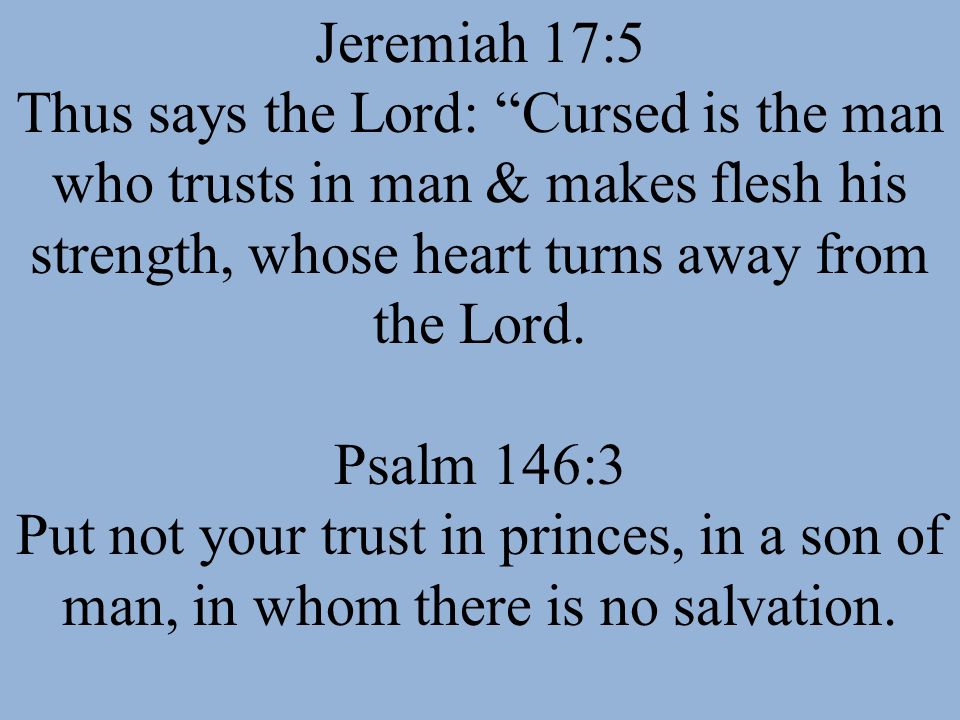
Jeremiah 17:5-8; Psalm 1; 1 Corinthians; LUKE 6:20-26
Cursed is the man who trust in man… He shall dwell in the parched places of the wilderness, in an uninhabited salt land. Blessed is the man who trusts in the Lord… He is like a tree planted by water, that sends out its roots by the stream, and does not fear when heat comes, for its leaves remain green. That’s a beautiful image: the good man, the just man, the man that trusts not in men but in the Lord is like a shady tree planted on the edge of the river, roots running into deep clear water, never short of cool moisture. It’s Jeremiah Ch.17. But back in Ch.12 the prophet sings a different song: using the same image of the tree, he now points it in exactly the opposite direction. Why does the way of the wicked prosper?, he complains. Why do all the treacherous thrive? You planted them, he reminds God, so they have taken root. They are growing, bearing fruit, these wicked people and they care nothing for You. You are near in their mouth but far from their mind.
It’s the same thing in the Psalms. Today Ps.1 tells us, Blessed is the man who follows not the counsel of the wicked… He is like a tree that is planted beside the flowing waters… Not so are the wicked, not so! For they like winnowed chaff shall be driven away by the wind. But listen to Ps.73: I was envious of the arrogant, the Psalmist admits, when I saw the prosperity of the wicked. For they have no pangs; their bodies are sound and sleek. They are not in trouble as other men are; they are not stricken like other men… The words drip with resentment and indignation: pride is their necklace, he sneers;violence covers them as a garment. Their eyes swell out with fatness, their hearts overflow with follies. They scoff and speak with malice; loftily they threaten oppression… [And, then, O indignation!] the people turn to them and praise them, and find no fault in them!
It is not difficult to sympathise with all this, is it? A student comes to me holding an essay to protest at the mark I have given: “But, Father,” he says indignantly, “I worked very hard on this!” The logic here is: I worked very hard on this essay, therefore it must be a good essay. I am just as bad, of course. How often have I nursed in my breast the same resentment that some other guy is able to do so much better and more easily what I have struggled so hard to do much less well? Why do the lazily brilliant prosper? Why are the rich and powerful so smoothly and smugly able to be so infuriatingly confident that they are the Masters of the Universe – that they can simply get away with lying and stealing, that nothing can go wrong that they cannot make right or replace?
We have all felt this. But there is something very Old Testament about it. If my relationship with someone is governed by commandments or a contract according to which, if I do so-and-so for you as I have agreed, then you will do this-and-this for me as you have agreed – if that is how we understand our relationship, then I will be right to feel indignant when I do what the commandment or our contract requires of me but you don’t. The Old Testament idea of a ‘covenant’ as a contract between God and humankind doesn’t quite capture the way Jesus thought or taught. His was a ‘new covenant’, a ‘new testament’. When Moses came down from Mount Sinai, his face shining so brightly he had to cover it with a veil, he carried two tablets of stone with the commandments of God, the terms of their Covenant. As we hear in today’s gospel, when Jesus came down from the hills where he had been praying and choosing his Twelve to represent the new People of God, he brought something very different. Not commandments written in stone but a Living Word.
What’s the difference between Blessed is the man who follows not the counsel of the wicked… but whose delight is in the law of the Lord, which we heard in the Psalm, and Blessed are you who are poor, for yours is the kingdom of God, which we heard in the Gospel? Jesus’s blessing falls not merely on those who avoid sin and meditate on the law. It falls not on the one who avoids standing in the path with sinners. Indeed, Jesus emphasised that he came precisely not for those who keep themselves apartfrom sinners but for those sinners themselves. He himself never kept apart from sinners: he walked on their paths, deliberately put himself in their way. And the first to experience the kingly rule of God were those who could admit that they were sinners. They, and not the righteous or the self-righteous, were the ones to be forgiven, healed, restored to the community.
As we all know, the first of Luke’s beatitudes – Blessed are you who are poor – is significantly different from Matthew’s for Jesus blesses not just “the poor” but “the poor in spirit”. When we were reflecting together yesterday on our vow of religious poverty, I think I heard two different conceptions of that vow: one focused on our vow of religious poverty as an expression of our particular means of following Christ, a means recognised by the Church and institutionalised by Ignatius in our Society. It is our particular way of being saved. The other conception focused more on the apostolic nature of our vow of religious poverty – or at least of the way of life it demands and makes possible. There’s no question of choosing between them.
We live religious poverty because it frees us from attachments and for our mission to move among and minister to all, especially but not exclusively, among the actually poor. It might be that, as one grows older, the first of these conceptions begins to take front of stage while the second speaks more directly to the young among us. But our vow cannot be understood without both. “The vow of poverty,” as Fr General writes in his letter, “is one of the most effective means for identifying ourselves with Jesus, the way to the Father, by the power of the Holy Spirit. Living it in the 21st century requires us to deepen the spiritual experience that we are called to incarnate in today’s world in keeping with the charism received by St Ignatius and the first companions.” St Ignatius, pray for us.
Stephen Buckland SJ
Arrupe Jesuit University, Harare, Zimbabwe
Chapel of the Holy Name.
